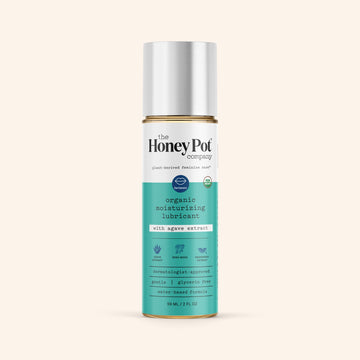Although having a perfectly well-groomed, properly doted-on vagina that you check in with regularly is an inspiring goal, the truth is sometimes you kind of forget about it. Life gets busy, and there’s more noticeable skin to pay attention to until, all of a sudden, something feels wrong down there. Time out!
You’re struck with a case of tingling, irritable skin. Is there any more immediate attention-grabber than an itchy vagina?
This is your body’s way of telling you it’s time to shift your focus back onto your honey pot and experience some TLC. What causes an itchy vulva? There are a few possibilities, so let’s get to the bottom of this mystery!
Is Vaginal Itching a Concern?
An itchy vulva is a super common symptom that can happen from time to time. It may indicate a minor irritation, like an allergic reaction, skin irritant, rash, or harmful lifestyle choice (like wearing sweaty or tight clothing). These tend to be simple to treat and have a fast recovery time.
Yet, vaginal itching can also be due to more severe concerns, so let’s eliminate some potential culprits.
What Causes Vaginal Itchiness Without Discharge?
There are many possible causes of vaginal irritation and itchiness, ranging from mild to intensive.
Fortunately, if you’re experiencing itchiness but no vaginal discharge, you’re pretty safe to rule out a few particular issues, like vaginal yeast infections, vulvovaginitis, candidiasis, and bacterial vaginosis. You can also rest assured it likely isn’t a sexually transmitted infection (STI or STD), including trichomoniasis, genital herpes, gonorrhea, or chlamydia.
Each of these generally comes with side effects, including vaginal discharge. However, it’s best to visit your doctor to safely dismiss infections and sexually transmitted diseases as the reason for your discomfort.
With these bad boys likely out of the picture, what could be the cause of no discharge, just itch? Here are a few potential answers, all with minor treatment.
Irritating Ingredients
You may think your vagina is tough, but truth be told, it can be sensitive! Chemical and synthetic ingredients can irritate the sensitive skin of your vulva.
Some common products that may contain anger-inducing ingredients include laundry detergents and fabric softeners, creams and lotions, soaps, lubricants, sprays, bubble baths, shampoos, tampons, and even toilet paper. Aim to use products that are formulated to be gentle on sensitive skin.
Along with irritating ingredients, some habits can set off your vaginal flora. Douching is commonly touted as a healthy cleaning ritual when in reality, it can strip your vaginal microbiome of healthy bacteria. An unbalanced vaginal flora will cause impossible-to-ignore symptoms like itching, discharge, or burning.
Your vagina doesn’t need you to clean it out by douching — instead, you should eat a diet rich in probiotics, take care of it with gentle products, and drink plenty of water to flush out toxins. In summary, lay off the douching and steer clear of irritating ingredients!
Shaving Burns
Shaving irritation is a common cause of itchiness downstairs. However, this doesn’t mean shaving is a no-go. Whether you want to be as smooth as a dolphin or let the bush be free, you do you!
Just don’t live with itchy razor burn in the process of keeping things tidy down there. Make sure to include exfoliation, a soothing wash, a sharp razor, and post-shave moisturization when saying goodbye to pubic hair.
Tight Clothing
What you wear affects the health of your vaginal area because clothing can be equally as irritating as skin products. Undergarments and pants can create friction that irritates the delicate vulvar skin.
Be careful not to wear tight clothes or thongs multiple days in a row, and give your vagina time to breathe each day. Cotton underwear should be your best friend, as the material is absorbent and comfy.
Eczema
Genital eczema is a skin condition characterized by itchiness, skin redness, scaly texture, and vaginal dryness. Sometimes, blisters can be a symptom, as well. Eczema can occur in and around the genital area, including the labia, anus, and buttocks.
Eczema shouldn’t be confused with psoriasis, a chronic skin disease that also causes rash, itchiness, and scaly patches. Both are painful but treatable, so seek medical help if you suspect either condition.
Contact Dermatitis
Contact dermatitis is a form of eczema that causes a painful rash due to an allergic reaction. Vaginal dermatitis can be caused by irritating ingredients, clothing, body washes, or any feminine hygiene product that isn’t formulated for sensitive skin.
How Do I Treat an Itchy Vulva?
If you think your itchiness is due to a skin condition, make an appointment with your healthcare provider. They may recommend an antifungal or antiviral topical or antibiotic for vaginal infections. Over-the-counter steroid creams like hydrocortisone are also often prescribed for itching and pain.
If the cause of your itch is a non-intensive issue, treatment is simple! Drink lots of water, wear loose clothing, and cater to your vulva’s sensitive nature. There are home remedies and DIY ointments that get a good rap, but always be careful what you put on your vulva.
Truly, the best way to keep your genitals itch-free is to use hypoallergenic, gentle-on-skin products designed for happy vaginas.
Itchy Vagina No More!
Vaginal health is pretty straightforward. A routine that incorporates gentle cleaning, breathing room, and good eating and drinking habits should keep you in the clear from vaginal itching.
If you do experience intense itching, first get checked out. Then, be kind to your honey pot with safe-for-skin feminine care that’s designed for sensitivities. You’ll be able to say “Good, bye” to itchiness in no time.
Sources:
Female genital eczema | National Eczema Society
Psoriasis | National Institute of Arthritis and Musculoskeletal and Skin Diseases
Vaginal discharge—causes, diagnosis, and treatment | National Library of Medicine
Vaginal Douching: Evidence for Risks or Benefits to Women's Health | National Library of Medicine






